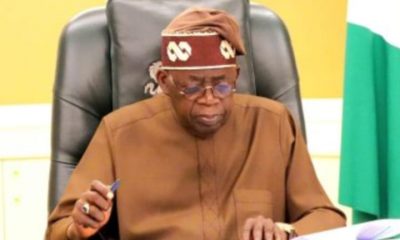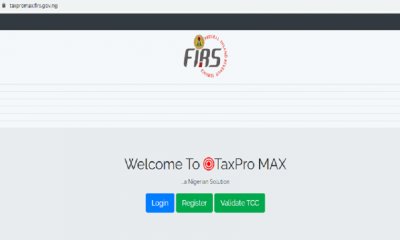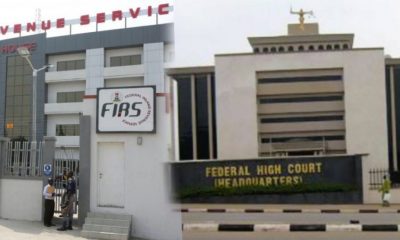General
Again, NIPOST Barks at FIRS Over Stamp Duty
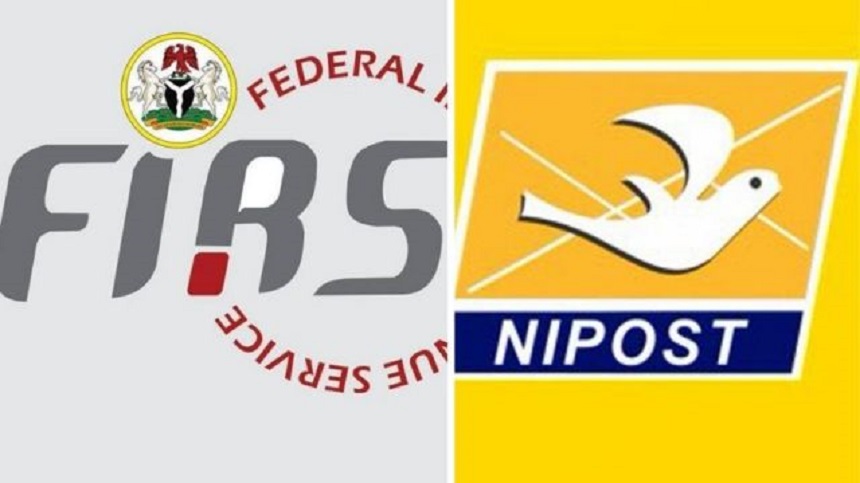
By Adedapo Adesanya
The Nigerian Postal Service (NIPOST) has fired back at the Federal Inland Revenue Service (FIRS) over which of the two government agencies collects stamp duties.
Last Tuesday, the FIRS’s Director of Communication and Liaison, Mr Abdullahi Ismaila Ahmad, while responding to tweets by Chairperson of the board of NIPOST, Mrs Maimuna Abubakar, said the tax agency was more than ever determined to ensure that all monies collected by NIPOST into its “illegally” operated Stamp Duties Account were fully remitted into the federation account.
But in a statement issued on Sunday in Abuja by the General Manager, Corporate Communications, NIPOST, Mr Franklin Alao, the postal organisation disputed claims made by the tax body that it will ensure that any kobo not accounted for in that account is legally recovered in line with the charge of President Muhammadu Buhari to the recently inaugurated Inter-ministerial committee on the recovery of stamp duties from 2016 till date.
Mr Alao explained that the account in question was opened by the Central Bank of Nigeria (CBN) under the Treasury Single Account (TSA) in consultation with the office of Accountant General of the Federation (AGF), in the name of NIPOST Stamp Duties Collection Account when CBN gave instruction to Deposit Money Banks (DMBs) to commence the deduction of N50 stamp duties from bank customers accounts.
He stated that the account belongs to the Nigeran government, adding that NIPOST does not have access to whatsoever monies lodged into the account, as such the question of illegality and misappropriation does not arise.
Mr Alao insisted that under the extant laws of Nigeria, NIPOST Act 2004 provides and vest solely in NIPOST the power to print adhesive postage stamps, which is the instrument for denoting documents and other transaction instruments in compliance with the provisions of the Stamp Duties Act.
“Historically, the post in Nigeria, just like in the comity of nations, has at different times produced adhesive postage stamps and revenue stamps for the federal government.
“It is to this end that NIPOST seeks the proper implementation of the Finance Act. NIPOST is therefore taken aback when FIRS took to the Twitter to call out the Chairman, NIPOST Board, Barrister Maimuna Yaya Abubakar, who only tried to bring the attention of the Service and public that NIPOST would be emasculated if the Act is not properly implemented.
“More so when there was a meeting between FIRS and NIPOST in July 2013 in the office of the Executive Chairman of FIRS and resolution reached that NIPOST is statutory duty-bound to provide the stamps to be used by FIRS at both federal and state levels. We wish to reassure members of the public that NIPOST as a responsible government institution has always operated within the ambit of the law.
“We, therefore, urge the general public to disregard the statement credited to the Director, Communication and Liaison, FIRS on the issue,” he said.
The two government agencies had in recent times engaged each other in media war over whose responsibility it is to collect the Stamp Duty charge for the government.
This kick-started when Mrs Maimuna Abubakar, in her tweets last Sunday alleged that FIRS was stealing NIPOST idea.
She said NIPOST was saddled with the responsibility of printing and providing postage stamps for payment of postage tariff and payment of stamp duties by the decree No. 18 of 1987.
General
NCDMB Targets Midstream Compliance to Boost Nigeria’s Industrial Growth

By Adedapo Adesanya
The Nigerian Content Development and Monitoring Board (NCDMB) has intensified its compliance drive in the oil and gas midstream segment, convening a high-level sensitisation workshop aimed at deepening adherence to the Nigerian Oil and Gas Industry Content Development Act.
The workshop, themed Compliance with the Provisions of the NOGICD Act 2010: A Pathway to Industrialization, held in Lagos, drew key operators across gas processing, transportation, storage and infrastructure development.
Speaking on behalf of the Executive Secretary of NCDMB, Mr Felix Ogbe, the Director of Monitoring and Evaluation Division, Mr Omomehin Ajimijaye, described the midstream sector as “a critical bridge between upstream production and downstream utilisation.”
“The midstream segment plays a pivotal role in gas processing, transportation, storage and infrastructure development, all of which are essential pillars for achieving Nigeria’s industrialisation agenda,” Mr Ajimijaye said.
Mr Ajimijaye stressed that adherence to the NOGICD Act goes beyond regulatory obligation.
“Compliance with the NOGICD Act is not merely a statutory requirement,” he stated. “It is a strategic imperative for sustainable national development.”
He explained that the programme was structured to clarify registration processes, Nigerian Content Equipment Certification, expatriate quota requirements, statutory reporting templates and submission timelines.
“Our objective is to deepen stakeholders’ understanding of compliance requirements, address recurring gaps identified during Monitoring and Evaluation reviews, and foster constructive dialogue on operational realities within the midstream space,” he added.
According to Mr Ajimijaye, the board has received feedback from operators highlighting challenges in meeting Nigerian Content obligations, including reporting complexities and varying interpretations of certain provisions of the Act.
“As a responsive regulator and development-focused institution, we remain committed not only to enforcing compliance but also to providing guidance, clarity and the necessary support to enable stakeholders succeed,” he assured participants.
With Nigeria positioning gas as a transition fuel and economic growth driver, regulatory clarity in the midstream space is essential to unlocking investment and local capacity development.
The participants received technical presentations from key NCDMB divisions, including: Monitoring and Evaluation Division, Project Certification and Authorisation Division, Capacity Building Division and Zonal Coordination Division.
The interactive sessions provided practical guidance on engagement protocols with the Board and strengthened collaboration between regulators and operators.
General
AGF Fagbemi Takes Over Malami Prosecution from DSS
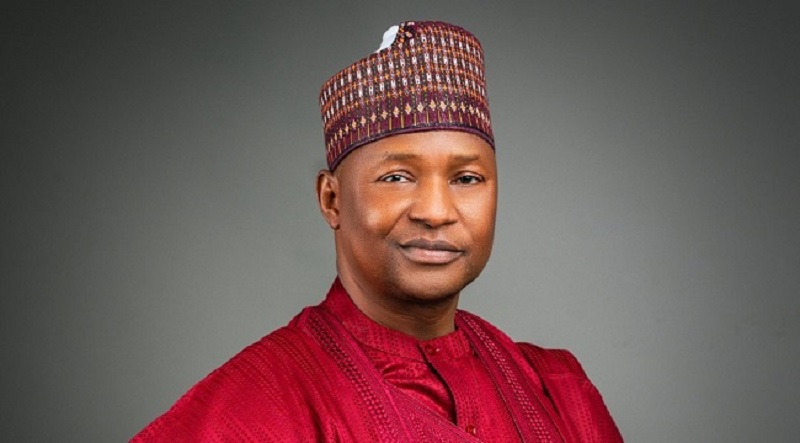
By Adedapo Adesanya
The Minister of Justice and Attorney General of the Federation, Mr Lateef Fagbemi, has taken over the prosecution of his immediate predecessor, Mr Abubakar Malami.
Mr Malami is facing terrorism and illegal firearms possession charges brought against him by the Department of State Service (DSS).
Mr Fagbemi, a Senior Advocate of Nigeria (SAN), took over the trial from the secret police on Wednesday at the Federal High Court in Abuja.
The Director of the Public Prosecution of the Federation, Mr Rotimi Oyedepo, announced the Attorney General’s appearance in the matter.
Mr Oyedepo told Justice Joyce Abdulmalik that the trial cannot proceed because Mr Fagbemi has just taken over the prosecution.
He informed the court that the prosecution needed more time to familiarise itself with the facts of the case.
Counsel to the defendants, Mr Adedayo Adedeji, who did not oppose the application, however, urged the court to strike out the matter if the prosecution fails to open its case at the next adjourned date, citing lack of diligent prosecution.
Justice Abdulmalik subsequently adjourned the matter to March 10 for trial and for the prosecution to formally open its case.
The court had, on February 27, admitted Malami and his son, Mr Abdulaziz, to N200 million bail, with two sureties, each one of whom must own landed property either in Maitama or Asokoro.
Justice Abdulmalik had said that the title of the property must be deposited with the Deputy Chief Registrar of the Court along with valid international passports.
The sureties were also ordered to depose to an affidavit of means and submit their two recent passport photographs to the court.
Mr Malami and his son were also ordered to submit their international passports and recent passport photographs to the court.
The DSS had arraigned the ex-AGF and his son, Mr Abdulaziz, on a five-count charge bordering on terrorism and illegal firearms possession.
In the charge, marked FHC/ABJ/CR/63/2026, filed before the Federal High Court in Abuja, Malami is also accused of refusing to prosecute suspected terrorism financiers, whose case files were handed to him while he served as the AGF and Minister of Justice.
Mr Malami and Mr Abdulaziz are equally accused of warehousing firearms in their residence at Gesse Phase II Area, Birain Kebbi LGA, Kebbi State, without lawful authority.
The DSS accused Mr Malami in count one of the charge, with knowingly abetting terrorism financing, while the ex-AGF and his son are charged in counts two to five, with unlawful, possession of a Sturm Magnum 17-0101 firearm, 16 Redstar AAA 5720 live rounds of cartridges and 27 expended Redstar AAA 5’20 cartridges, contrary to and punishable under relevant Sections of Terrorism (Prevention and Prohibition) Act, 2022 and Firearms Act, 2004.
General
NPA Records 24.8% Growth in Total Cargo Volume for 2025

By Adedapo Adesanya
The Nigerian Ports Authority (NPA) has announced a significant 24.8 per cent increase in total cargo throughput for 2025.
According to the NPA’s 2025 Operational Performance Report, total cargo throughput rose from approximately 103.6 million metric tons in 2024 to over 129.3 million metric tons in 2025.
The report identified Lekki Port as Nigeria’s leading port, accounting for 40.6 per cent of the nation’s total cargo throughput. Onne Port followed with 19.1 per cent, while Apapa Port handled 16.7 per cent.
Beyond volume, Lekki Port also received the largest vessels, recording an average Gross Registered Tonnage (GRT) of 55,712, slightly higher than Onne Port’s 53,022 GRT.
Apapa and Tin Can Island ports recorded average vessel sizes of 33,251 GRT and 36,909 GRT, respectively, while Delta Ports handled vessels averaging 17,414 GRT.
Although Tin Can Island Port recorded the highest frequency of ship arrivals, accounting for 22.7 per cent of total ship calls, Lekki and Onne are increasingly attracting larger “heavyweight” vessels, strengthening Nigeria’s capacity to handle higher-value cargo.
The data showed that imports continued to dominate cargo traffic, and the report highlighted a steady rise in outward trade. Exports accounted for 39.0 per cent of total cargo throughput, while inward traffic represented 59.2 per cent.
Containerised cargo, widely regarded as a key indicator of trade activity, recorded substantial growth. Total container traffic increased by 25.7 per cent, surpassing 2.1 million Twenty-foot Equivalent Units (TEUs).
Import-laden containers surged by 32.8 per cent, while export containers rose by 3.1 per cent. Notably, transhipment containers recorded a remarkable 205.8 per cent increase, positioning Nigeria as an emerging regional logistics hub serving West and Central Africa.
Liquid bulk cargo, including petroleum products and chemicals, remained the dominant commodity category, accounting for 54.7 per cent of total cargo, while containerised cargo represented 24 per cent.
Speaking on the report, the Managing Director of NPA, Mr Abubakar Dantsoho, described the 2025 performance as a historic milestone.
“Nigeria’s maritime sector recorded a historic surge in activity in 2025, driven by increased cargo throughput, rising container traffic, and a growing export footprint. This underscores the Federal Government’s commitment to economic diversification,” he said.
Looking ahead, Mr Dantsoho expressed confidence that the Federal Government-approved port modernisation programme and the implementation of the National Single Window system would power the next phase of growth.
The comprehensive modernisation initiative aims to rehabilitate ageing infrastructure, deepen berths, upgrade quays, expand cargo-handling capacity, and deploy advanced digital solutions across Nigeria’s ports.
The reforms are expected to reduce vessel turnaround time, cut cargo dwell time, improve safety standards, and boost overall operational efficiency.
-

 Feature/OPED6 years ago
Feature/OPED6 years agoDavos was Different this year
-
Travel/Tourism10 years ago
Lagos Seals Western Lodge Hotel In Ikorodu
-

 Showbiz3 years ago
Showbiz3 years agoEstranged Lover Releases Videos of Empress Njamah Bathing
-

 Banking8 years ago
Banking8 years agoSort Codes of GTBank Branches in Nigeria
-

 Economy3 years ago
Economy3 years agoSubsidy Removal: CNG at N130 Per Litre Cheaper Than Petrol—IPMAN
-

 Banking3 years ago
Banking3 years agoSort Codes of UBA Branches in Nigeria
-

 Banking3 years ago
Banking3 years agoFirst Bank Announces Planned Downtime
-

 Sports3 years ago
Sports3 years agoHighest Paid Nigerian Footballer – How Much Do Nigerian Footballers Earn


